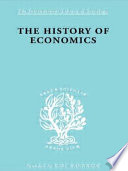 | Wolfgang J. Koschnick - 1998 - 876 lapas
...attainment and with the use of the material requisites of well-being." Dagegen schreibt Ch. L. Robbins: „Economics is the science which studies human behaviour as a relationship between ends and scarce means which have alternative uses." Sehr eng gefaßt ist demgegenüber die Definition von Paul A. Samuelson:... | |
 | Werner Stark - 1998 - 96 lapas
...constancy by sacrifices in his well-being. If Robbin's definition of political economy be correct — " economics is the science which studies human behaviour as a relationship between ends and scarce means " (An Essay on the Nature and Significance of Economic Science, 1935, 16) — it is clear that the... | |
 | Edward Craig - 1998 - 900 lapas
...preponderate in a specific domain of social life (l836: 323). Robbins, in contrast, defined economics as 'the science which studies human behaviour as a relationship between ends and scarce means which have alternative uses' (l932: l5). In Robbins' view, economics is not concerned with production,... | |
 | Don Ross - 1999 - 392 lapas
...alludes to a definition of Economics which he had defended in Chapter One. The definition is as follows: "Economics is the science which studies human behaviour as a relationship between ends and scarce means which have alternative uses." Here, we pass over the direct defense of this definition in order to... | |
 | Irene Sagel-Grande - 1999 - 196 lapas
...acknowledged. Let us take a few steps backwards and start at Robbins' well-known definition of economics as: the science which studies human behaviour as a relationship between ends and scarce means which have alternative uses.2 According to this - now commonly accepted - definition the central concept... | |
 | David L. Sills, Robert King Merton - 2000 - 466 lapas
...American Economic Association, New Orleans, December 1986. Lionel Robbins 1898-1984 British economist 1 Economics is the science which studies human behaviour as a relationship between ends and scarce means which have alternative uses. An Essay on the Nature and Significance of Economic Science (1932) 1984:16.... | |
 | Wilfred Beckerman, Joanna Pasek - 2001 - 229 lapas
...alternative course of action. After all, Lionel Robbins's (1935: 16) famous definition of economics was that 'Economics is the science which studies human...behaviour as a relationship between ends and scarce means which have alternative uses'. However, as most professional economists have long been well aware, attempts... | |
 | Kevin D. Hoover - 2001 - 204 lapas
...(1920), p. 1. Modern economists almost all follow the much different definition of Lionel Robbins: Economics is the science which studies human behaviour as a relationship between ends and scarce means which have alternative uses.12 Economics is, in Robbins's view, the science of choice. Economics is,... | |
 | Kevin D. Hoover - 2001 - 330 lapas
...hospitable to macroeconomics, has now largely been supplanted by that of Lionel Robbins (1935, p. 16): "Economics is the science which studies human behaviour as a relationship between ends and scarce means which have alternative uses." On Robbins's definition, economics must be fundamentally about the individual.... | |
 | Uskali Mäki - 2001 - 420 lapas
...hospitable to macroeconomics, has now largely been supplanted by that of Lionel Robbins (1935, p. 16): "Economics is the science which studies human behaviour as a relationship between ends and scarce means which have alternative uses." On Robbins's definition, economics must be fundamentally about the individual.... | |
| |